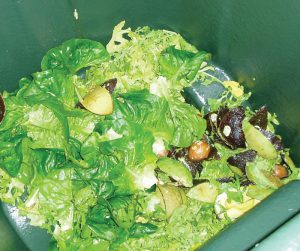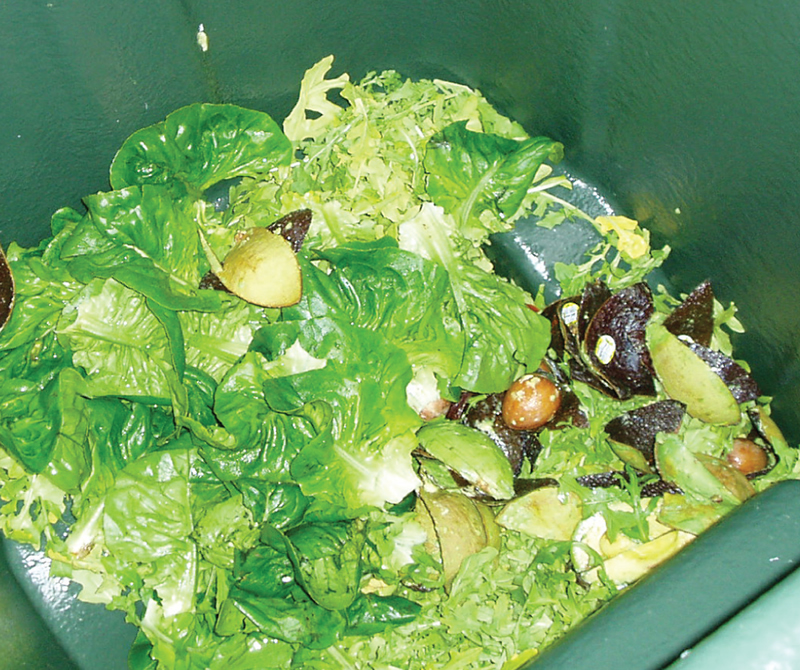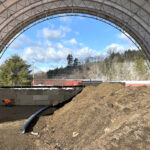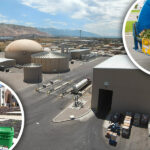What does it take for one of the largest hotels in San Diego, California, to reduce food waste?
Ana Carvalho
BioCycle May/June 2019

The waste diversion station (above) in the employee restaurant (below) is color coded by commodity stream with clear signage listing items that are accepted in each bin. Photos courtesy of Hilton San Diego Bayfront Hotel
The Hilton San Diego Bayfront Hotel was the first hotel to join the City of San Diego, California’s voluntary Commercial Food Waste Composting Program in 2012. The 30-story, 1,190 rooms, AAA Four Diamond Award hotel has 165,000 sq. ft. of indoor/outdoor event space. It is conveniently located downtown facing the San Diego Bay, next to the San Diego Convention Center and across from Petco Park. The hotel offers six dining venues, and provides catering services to hundreds of conferences and special events annually. The Bayfront Hotel management, which strives to be environmentally responsible and sustainable, implemented a comprehensive recycling program, and jumped at the opportunity to participate in the food waste composting program.
When it first joined the program in 2012, the hotel averaged 47,000 covers/month (number of meals served) and was diverting between 3.5 to 4 tons/week of food waste, translating to approximately 0.65 lbs. of food waste per cover. That high volume of food waste was not uncommon in the hotel industry at that time. But it led the Bayfront to contract with Lean Path, food waste prevention specialists, to study what, where and why food waste was generated. The Lean Path study concluded that the hotel could significantly decrease its food waste by utilizing better knife skills, storage policies and menu planning.
The results have been extremely positive. As of 2018, food waste has been reduced to an average of 0.2 lbs/cover. This remarkable accomplishment also brought significant economic benefit to the hotel due to less purchasing, food waste hauling and composting facility tipping fees.
Planning And Implementation
Chef David Scalise and Executive Steward Saul Salgado combined forces with other hotel departments to achieve this substantial reduction. They worked to streamline the conference/event banquet menus, which make up the largest percentage of the hotel’s food production. The hotel had years of experience creating a consolidated menu, featuring a different menu for each day of the week. By narrowing the food options for the day, it decreased the daily variety of food preparation and dishes, which successfully decreased the amount of food waste generated.
These menus encompass different demographical preferences. For example, participants at a health care conference will, in general, prefer a more health-conscious menu than another type of conference. A predominately European group may prefer a different type of menu than an American group. By observing the specific characteristics of each group and their general food preferences, the Bayfront is able to provide desirable selections, while minimizing uneaten food, and eliminating food waste from unnecessary preparation of meals/foods that would otherwise be left on the table. This practice has been beneficial, proven by several recurring events hosted annually. Scalise and Salgado add that some prospective clients inquire about the Bayfront’s environmental practices, as they will not do business with sites that don’t have a sustainability program, including a food waste diversion program.

Source separated kitchen food waste and material from the employee restaurant are composted at the City of San Diego’s Miramar Greenery. Photos courtesy of Hilton San Diego Bayfront Hotel
Employees are considered “internal guests;” approximately 500 meals are served to staff each day. At the newly remodeled team member restaurant, Café Azul, employees can choose from a variety of dishes that include some repurposed food that was not served at the events. For instance, an event menu requires 1,000 chicken breasts, but only 900 are served. The remaining pieces are properly cooled and repurposed in different dishes such as fajitas or tacos. Pastries not served or added to the buffet, like croissants or Danish, may be repurposed as bread pudding.
The steward team makes sure that properly marked food waste containers are conveniently located for kitchen, banquet, and room services staff, and at the team members’ restaurant. Employees are trained to separate restaurant waste into trash, recyclables and food waste at the waste diversion stations. Steward staff visually inspect the loads prior to dumping them into the food waste compactor, making sure there is no contamination, and providing feedback to the Chef and employee supervisors.
Chef Scalise notes that source reduction of food waste is a direct result of working smartly. “It involves a combined undertaking from the entire hotel staff to meet the guests’ needs, build good relationships with event representatives, and comply with our commitment to sustainability,” he explains. “The Bayfront hotel’s ultimate goal is to provide a memorable dining experience for the guests.”
The next phase in the hotel’s food waste diversion program is participating in the San Diego Food Systems Alliance’s (SDFSA) Smart Kitchens San Diego (SKSD) initiative. Funded by a grant from California’s Department of Resources Recycling and Recovery (CalRecycle), SKSD is subsidizing the installment of LeanPath food waste tracking technology to further study other opportunities to increase source reduction and implement a robust edible food donation program. With strides already made by the Hilton San Diego Bayfront Hotel through source reduction and composting, adding a comprehensive edible food donation program will only further increase its already successful food waste diversion.
Ana Carvalho, MS, Environmental Specialist, is a Contributing Editor to BioCycle.













